TSC Impact Report 2021
Overall THESIS scores up 38% since baseline year of 2016
From 2016 to 2020, the THESIS assessments of product manufacturers have improved (relatively) 38%, from 32.5% to 45% (where 100% equals the maximum score).
This is an indication that the systems and processes put in place by THESIS users to regularly assess one’s sustainability performance are creating positive changes. Scores showed that performance improved in 2020 after largely remaining the same between 2018 and 2019, indicating that companies pursued sustainability improvements even during the challenges of the 2020 global pandemic.
Across these years, we have observed particularly significant improvements in greenhouse gases, water use intensity, air quality, worker health and safety, and management systems to manage biodiversity in sourcing.
The number of companies using THESIS has remained relatively stable over that same time period, ranging between 1,500 and 1,700. The average score of companies using THESIS in both 2019 and 2020 increased from 45% to 49%.
THESIS brands and manufacturers making sweeping improvements
About 93% of all brands and manufacturers who shared their assessments on THESIS took actions to improve their THESIS score and product sustainability. As you can see in the image/table, 23% of manufacturers worked with their suppliers on sustainability issues, and almost 9% of those manufacturers included sustainability requirements in their supplier contracts. Also, amongst the most common actions was changing product or packaging design (19%), changing internal processes or procedures (14%), creating data systems (12%), and public disclosure of sustainability data. Over 7% of manufacturers looked for external help from consultants or NGOs.
It’s worth noting that these actions both help improve sustainability but also help the manufacturers get a higher THESIS score, demonstrating that TSC’s “Theory of Change” is working. By highlighting the most materially significant issues within a product’s supply chain and asking about sustainability progress on those hotspots, THESIS focuses attention and drives action.
Sustainable Packaging on the Rise
The New Plastics Economy Global Commitment, a joint effort between the Ellen MacArthur Foundation and the UN Environment Programme, coalesces over 500 organizations towards a common goal of creating a more circular economy for plastic. One of the cornerstones of the Commitment is that, “All plastic packaging is 100% reusable, recyclable, or compostable.” This interest in using recycled content extends beyond plastic, to other materials such as paper fiber, metal, and glass.
To that end, THESIS data indicates that the percent of recycled content in packaging increased from 2019 to 2020 across a wide array of product types, from frozen foods to sports and outdoor products. This is a critical step – as companies use more recycled content, it creates better markets for it, leading to more investment in process improvements and efficiency.

When companies aren’t using recycled content in their packaging and instead using virgin (new) material, more of that material is being sustainably sourced. Again, across a wide range of product categories, the percent of sustainably sourced material has increased. Since glass, metal, and plastic are more difficult to identify as sustainably sourced, these data likely represent mostly increased in sustainably sourced paper fiber for packaging.

Companies Producing Home and Personal Care Products Increasingly Implementing Safer Practices
Increased consumer interest in the ingredients in their household cleaning products combined with the recently passed U.S. law, called the Sustainable Chemistry Research and Development Act, are driving progress in chemical policies among brands and retailers.
Safe use of products at home, in part, means that formulations are protected from microbiological breakdown and contamination when used. To achieve this level of safety, preservatives added to products or formulations are designed to inhibit microbiological growth. Figure 2 summarizes the THESIS 2019 performance on the topic of microbiological protection of products.

Companies are increasingly implementing practices towards safer products. While laws around ingredient disclosure have driven some of this, THESIS data shows that many companies go well beyond “compliance” in terms of their practices around risk assessment, product safety, and chemical footprinting. With ingredient disclosure to consumers, we see almost ¾ of suppliers not impacted by legislation still performing disclosure. As retailers and consumers continue to increase demonstration of their preference for transparency and safe chemistry practices, one would expect improvement to continue year to year.
INDUSTRY INSIGHTS
Learn about our insights in various sectors. Coming soon: Trends in Textiles
THESIS Case Study Features
Helping Brands and Manufacturers Improve
TSC offers a variety of services and resources to help brands and manufacturers improve their sustainability performance. On average, companies who utilized KPI Guidance to complete their THESIS assessments in 2020 performed 50% better than those who stated that they did not take advantage of the KPI Guidance.
Every THESIS KPI has Guidance which:
- Offers detailed calculation and scope guidance
- Outlines applicable certifications, standards and tools
- Offers additional background information and relevant definitions.
Another way that TSC helps brands is by providing a list of certified consultants. Since 2016, TSC has trained service providers on THESIS methodology to meet the rising demand of companies wanting external support in data collection and calculation, results validation, or turning their results into action plans for improvement.
a

In 2020, companies that indicated they worked with a TSC Trained Service Provider outperformed others by 34%.
a
a

Companies claim they gain a range of business benefits from using THESIS, included but not limited to:
- discussing their sustainability progress with retail customers,
- prompting sustainability discussions with their suppliers,
- benchmarking their practices to competitors, and
- being recognized by their retail customers
Additional resources and services available to THESIS users include, but are not limited to:
- Published Analytics – compare specific actions and progress against peers
- Prioritize Results Checklist – use THESIS results to inform or create your sustainability strategy
- Sustainability Communication Tools – Supply Chain Diagrams and Sustainability Snapshots
- Commodity Mapping – identify sourcing origins and associated risks
- THESIS Help Center – a living library of bite-sized support videos on THESIS KPIs and hotspots
- THESIS Live webinar series – stay engaged with peers year round
Membership to TSC offers the opportunity to be a part of THESIS KPI development and revisions, which gives a head start on annual assessments. Members also have access to personalized support from TSC staff and the opportunity to join innovation projects where diverse stakeholders work collectively to address sustainability challenges too complex for any one organization or individual to tackle alone.
e
TSC members have always been leaders, and that shows in THESIS 2020 results where TSC members, on average, scored 49% better than companies that are not members.
Highlights from TSC Innovation Activities
The purpose of the Innovation Program is to use TSC’s convening power and broad sustainability expertise to bring together diverse perspectives to tackle selected THESIS hotspots that can’t be solved by individual action alone. As we go into its 5th year, the Innovation Program will continue serving TSC members as a place where sustainability leaders can bring their challenges and find a collective path towards innovation.
2020 Innovation Program by the numbers: Funding generated between 2019 and 2020: $843,000
Stakeholders convened globally:

27 formal task force meetings

648 participants

148 organizations
EU-Focused Activities
Implementation projects in the Netherlands include collective projects in cooperation with retailers, wholesalers, caterers, and the Dutch government.
THESIS assessments are sometimes adapted to align with advanced data available in the Dutch market. The Dutch government and WUR also use the results in their sustainable purchasing criteria. For example, catering organizations that implement THESIS get bonus points in tenders from the Dutch government.

In 2020 we worked with the two largest wholesalers (Bidfood, Sligro) and the two largest caterers (Albron, Sodexo) in the Netherlands. The wholesalers and caterers sent their 47 suppliers 59 KPI assessments measuring 24 different product categories such as snacks, sauces, fruit, vegetables, animal protein products, and tropical fruit and tropical commodities (e.g. coffee, tea, rice and chocolate). The results were discussed in 1 to 1 buyer-supplier meetings focusing on jointly agreed improvement plans. The suppliers were benchmarked. At the end of the project, suppliers received feedback on how well they scored compared to their peers.
The aim of the 2020 project in the Netherlands was to standardize implementation processes so that more products were covered (24 different product categories). For snacks and sauces, we worked with the standard THESIS assessments. For tropical fruit and commodities, we designed one set of questions that focused less on quantitative data and more on processes and policies in place. We learned from previous implementation projects in the Netherlands that quantitative data is barely available for those products. Based on our experience with tropical goods, we designed a factsheet that addresses hotpots and that can be used for buyers and suppliers to better understand where improvement opportunities exist.
In 2021, the implementation project in the Netherlands continues where wholesalers and caterers will send THESIS assessments for different product categories to their suppliers.

2021 TSC Member and THESIS User Awards
Every year, TSC gives out awards to members who go above and beyond to help us meet our mission. This year we have included, for the first time, THESIS users who are leading the charge on improvement and communication of THESIS assessments. Congratulations to all of our award winners this year!
Themes Tackled 2020-2021
TSC had a record year of projects, grants and activities led by TSC staff from all over the world. Take a tour below of highlights from some of the themes we tackled in the last year.
Company Resources/Tools
THESIS Live Webinar Series
THESIS Live webinar series, designed for THESIS users and the broader consumer goods community, provided participants with information needed to act on pressing sustainability issues in supply chains.
THESIS Help Center
TSC created THESIS Help Center, a living library of short, self-guided support videos covering a broad range of topics.
Optimize Your Sustainability Performance Assessment
This guide is available for THESIS users to better maximize their performance on THESIS assessments.
THESIS One-pagers
Guides for consumer goods companies and buying teams to take action with THESIS.
Retailer Commitments
An analysis of public commitments made by a representative cross-section sampling of retailers in Europe and the United States.
TSC Trained Service Providers
These TSC-trained service providers can help companies address and conquer sustainability challenges through THESIS.
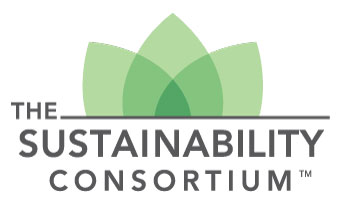


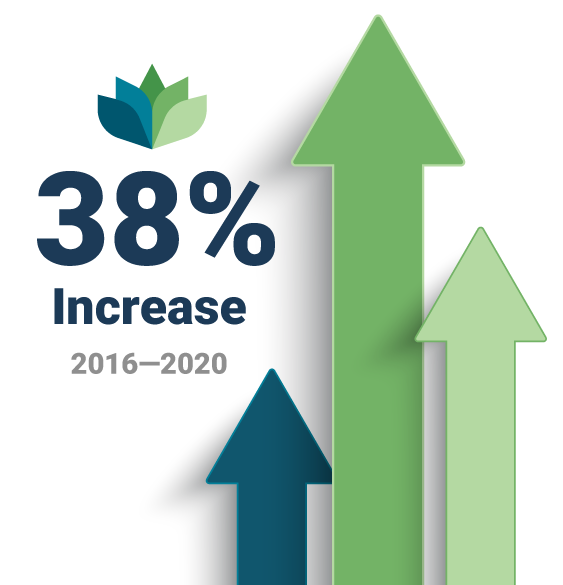
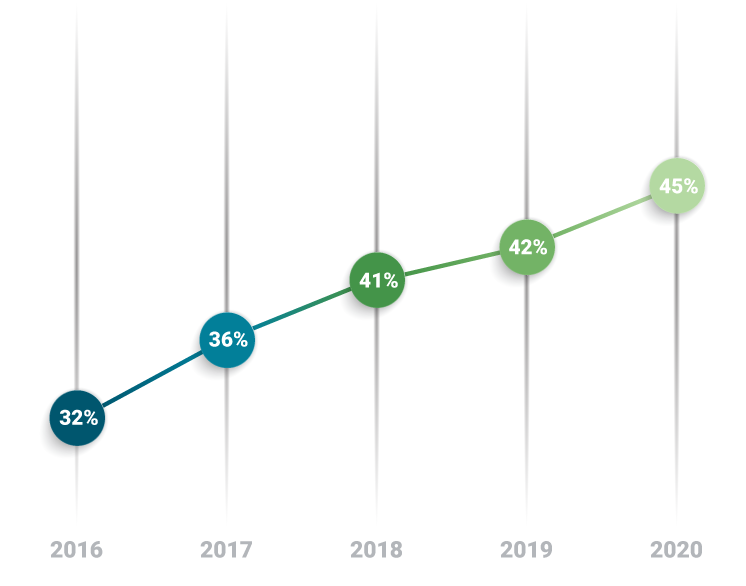


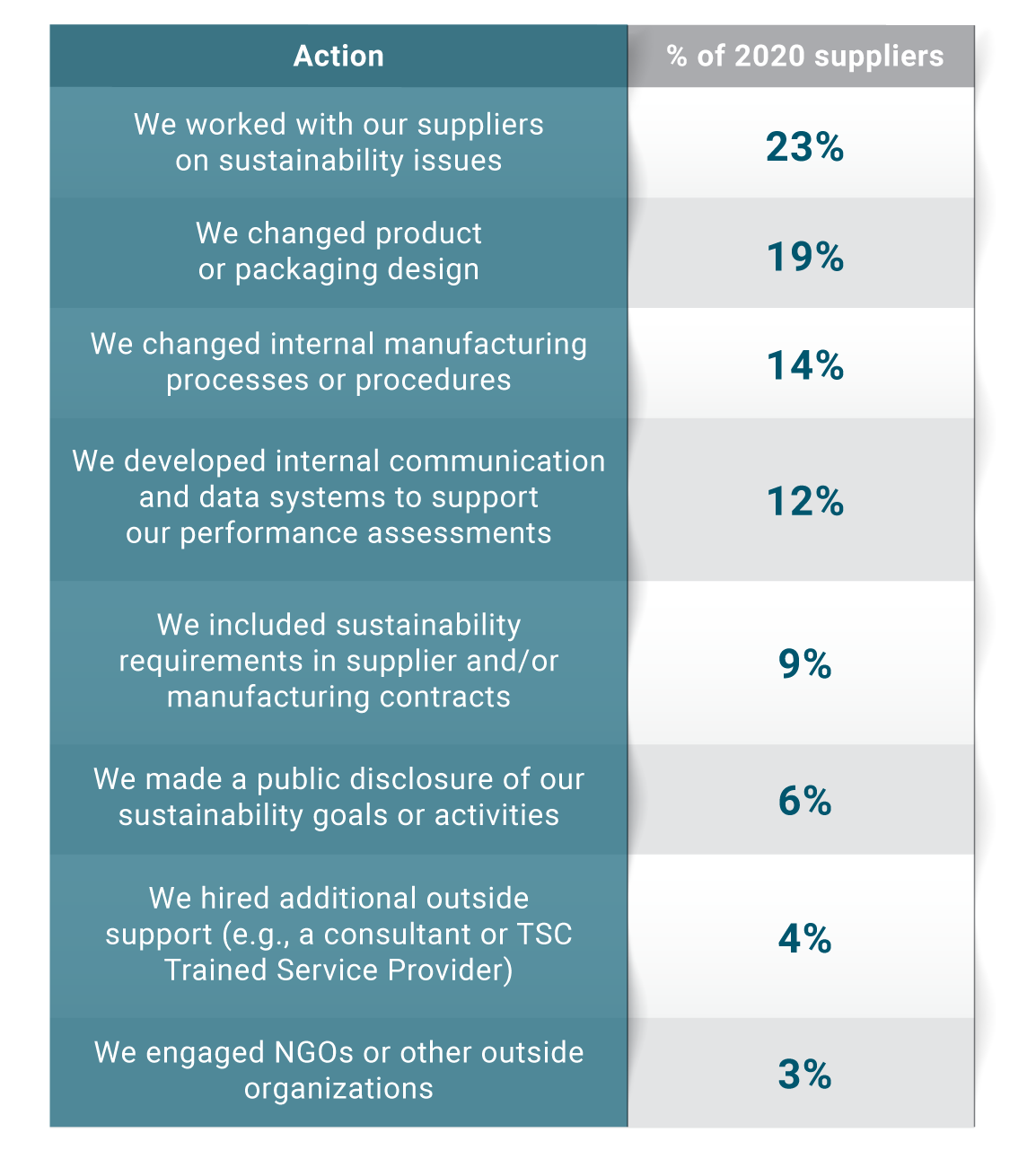


 Electronics
Electronics


 Paper Products
Paper Products 

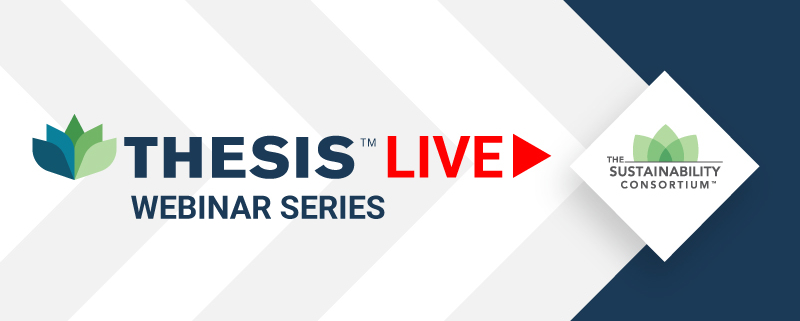
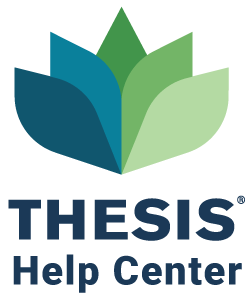
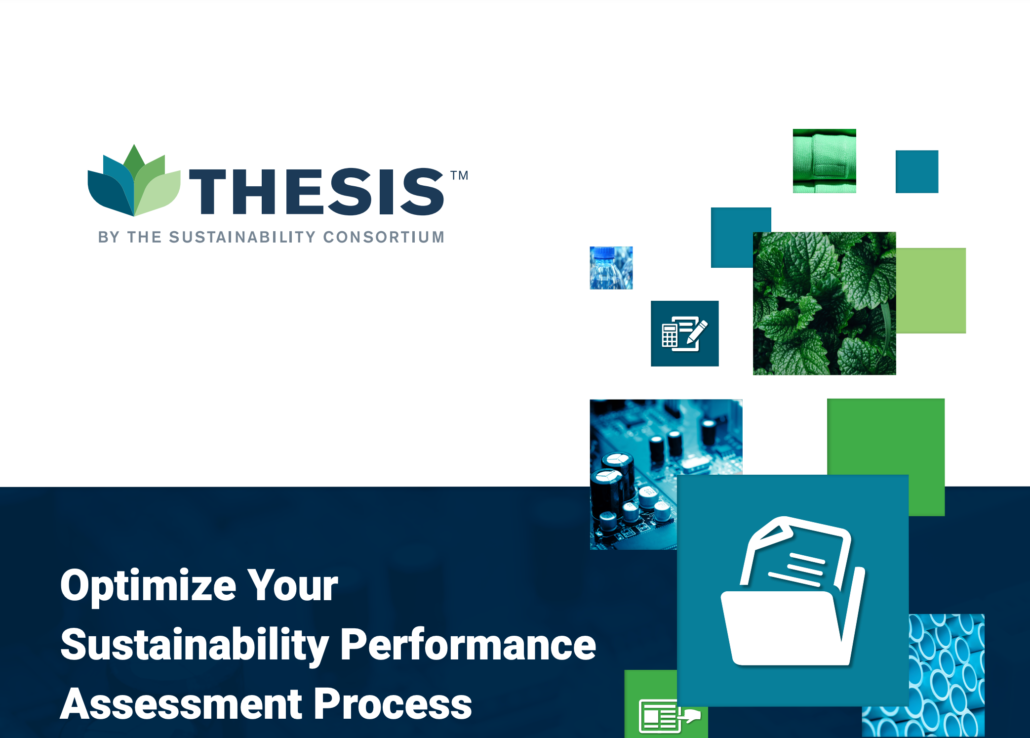
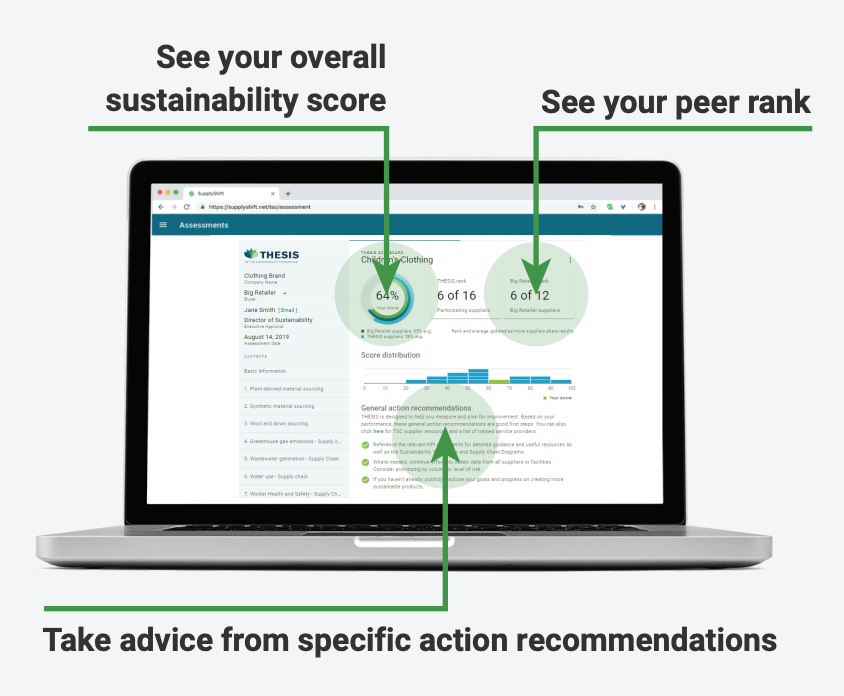

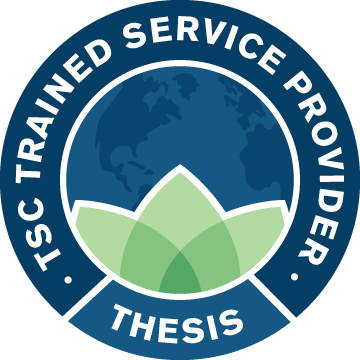
Past TSC Impact Reports
Sustainable Products for a Sustainable Planet
Sharing is caring.